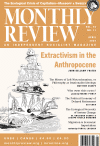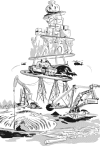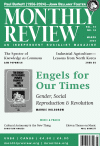
April 2024 (Volume 75, Number 11)
In a December 2023 interview with the Wall Street Journal, Richard Haass, former special assistant to H. W. Bush, declared that the world has descended into a “new world disorder,” lamenting the long-lost dream of unending U.S. hegemony. This month’s “Notes from the Editors” reflects on not only Haass’s recent statements, but his longstanding advocacy of an “Imperial America” designed to ensure U.S. domination on the world stage. | more…

Extractivism in the Anthropocene
This month’s Review of the Month by John Bellamy Foster illuminates the idea of extractivism, a key concept in understanding our current planetary crisis. The accelerated extraction of Earth’s resources since the mid-twentieth century, Foster notes, threatens not only the natural world, but the means of life for the entire planet. | more…

On the Misery of Left Nietzscheanism, or Philosophy as Irrationalist Ideology
Matthew Sharpe discusses Aymeric Monville’s Misère du nietzschéisme de gauche (The Misery of Left Nietzscheanism), an exploration of how Nietzsche’s popularity on the left co-opts truly radical energy in favor of authoritarianism and elitism. “If Monville is right,” Sharpe concludes, “Nietzcheanism has acted as a kind of ideological ‘useful idiot.’” | more…

Old Age but No Rest: A Political-Economic Reflection on Delayed Retirement Policy
As populations worldwide grow older, politicians are clamoring to raise the retirement age, thus extending people’s working lives at their own expense. Using the lens of political economy, Cai Chao examines the false narratives behind capitalists’ claims that delayed retirement is necessary to maintain society’s productive capacity, and proposes solutions to promote human development at all life stages. | more…

The Necessity of System Change: An Ecological and Marxian Synthesis
In a world of convergent crises, leading voices have called for radical changes to food, financial, and energy systems. However, these fail to account for a deeper systemic crisis: unfettered and accelerating of capital accumulation. In this article, M. Graziano Ceddia and Jacopo Nicola Bergamo provide a more comprehensive narrative, one which emphasizes capital as a social relation—and the potential of the environmental proletariat to dismantle its dominance. | more…

Who owns this ‘country’?
A new poem by Marge Piercy. | more…

The Ecological Crisis of Capitalism and Human Survival
In this remarkable reprise reprinted from Monthly Review‘s October 1992 issue, Harry Magdoff and Paul Sweezy look ahead to the ecological crisis that has continued to unfold into the twenty-first century. Presaging the critical juncture at which we find ourselves today, they write that “only a change in the in the nature of power structures on a global scale could bring a realistic hope for the long-term continuation of human civilization…. If you think that is true, what do you think are the implications?” | more…

The Political Economy of Migration
In this review of Immanuel Ness’s Migration as Economic Imperialism, Torkil Lauesen illuminates the links between the migration of labor to theories of equal exchange, which have traditionally focused on international trade. These connections, Lauesen writes, relate to transfer of labor power from the periphery to the core, and the concomitant exploitation of vulnerable workers from the Global South. | more…

March 2024 (Volume 75, Number 10)
Paul Burkett’s death on January 7, 2024, at age 67, means that the world is suddenly bereft of the figure who played the leading role over the last three decades in developing a Marxist ecological economics in the face of the growing planetary crisis. His loss leaves ecological Marxism without its foremost exponent of the ecological critique of capitalist value relations. It also means the loss of a warm and compassionate human being, and a beloved jazz musician. | more…

Engels for Our Times: Gender, Social Reproduction, and Revolution
“It is surprising,” Marnie Holborow writes, “how often in Marxist accounts of women’s oppression Frederick Engels is overlooked.” In responding to this gap in analysis, Holborow examines his influential work, The Origin of the Family, Private Property and the State, finding his observations on gender roles and social reproduction under capitalism—and their expressions based on class—are not only astute for Engels’s time, but very much for ours as well. | more…

The Specter of ‘Knowledge as Commons’
The recent arrest of Newsclick editor-in-chief Prabir Purkayastha is a chilling development in Indian Prime Minister Narendra Modi’s campaign of repression against free media. The current “moral panic” being mobilized against Purkayashta, Sam Popowich notes, represents Modi’s attempt to gain popular legitimacy for his Hindutva program and silence dissent. | more…

Industrial Agriculture: Lessons from North Korea
According to most Western commentators, North Korea is an “enigma” plagued by “irrational” leadership, poverty, and pervasive food shortages. Zhun Xu charts the evolution of North Korean industrial agriculture and the country’s efforts to feed its population from the Soviet era up until today. What, Xu asks, can we learn from the country’s efforts to industrialize its agricultural sector, and what do they tell us about the future of agriculture under socialism? | more…

Do It Yourself, Brother: Cultural Autonomy and the New Thing
Christian Noakes tells the story of the struggle to liberate jazz from the exploitative, white-controlled music industry in 1950s and beyond. Recounting the seminal events of the movement and backlash from white civil society, Noakes reveals a legacy of Black cultural autonomy and resistance led by such jazz legends as Charles Mingus, Max Roach, Eric Dolphy, Bill Dixon, and others. | more…